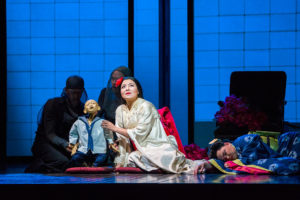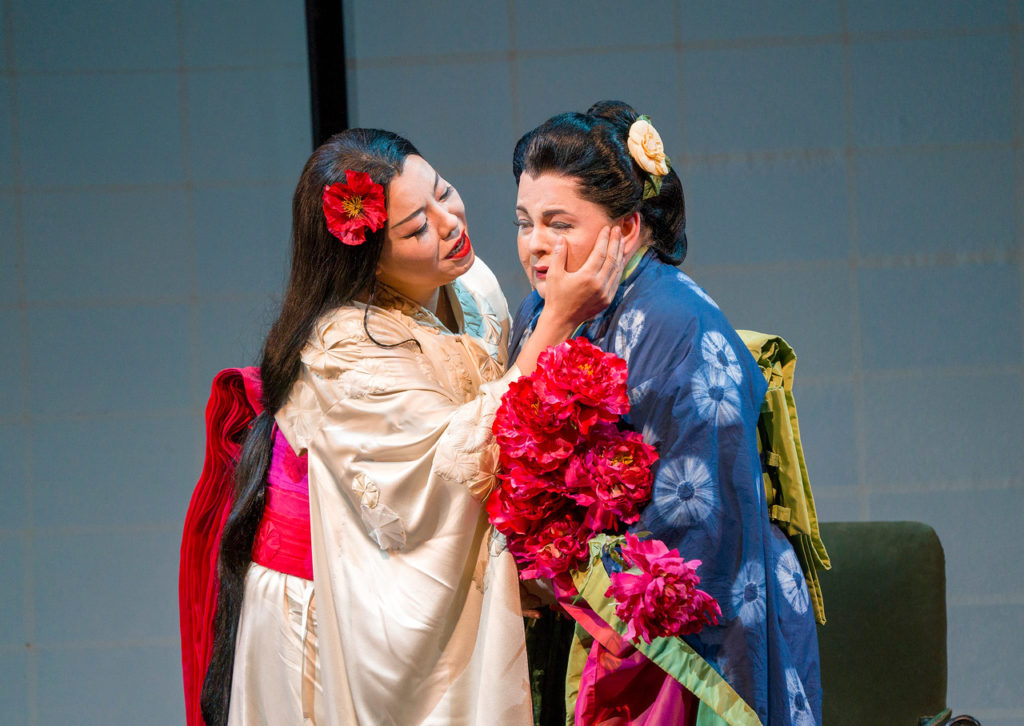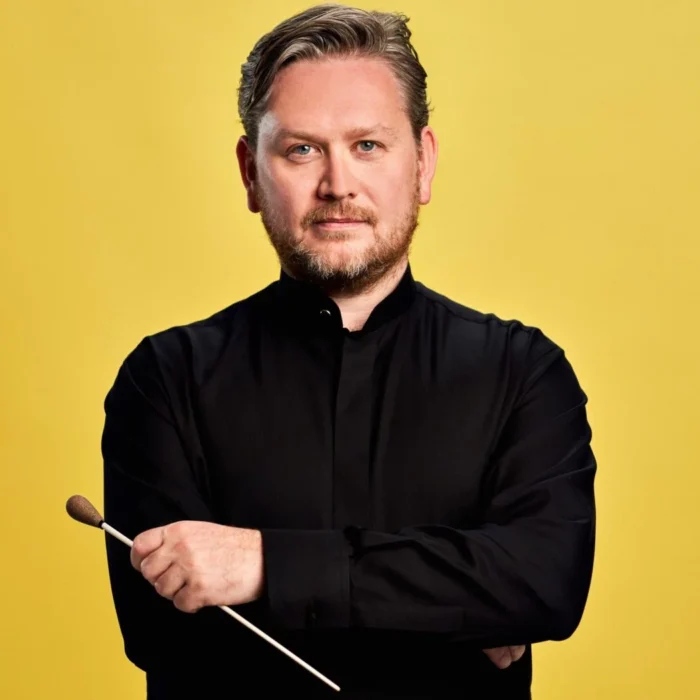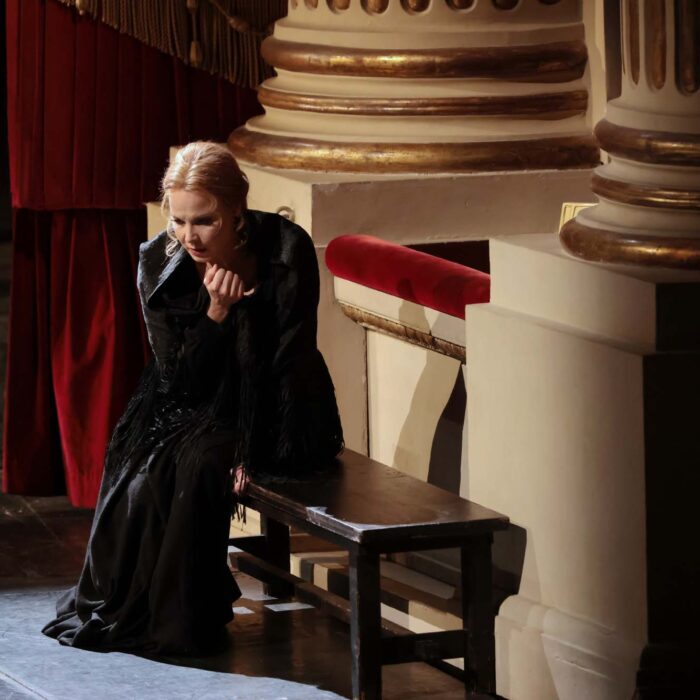
Metropolitan Opera 2019-20 Review: Madama Butterfly
Hui He Leads An Outstanding Cast In Puccini Revival
By Logan Martell(Credit: Richard Termine/Metropolitan Opera)
On Oct. 11, 2019, the Metropolitan Opera raised the curtain on this season’s premiere of Puccini’s “Madama Butterfly.” Anthony Minghella’s production is a compelling mixture of traditional and modern creative choices, able to lend beauty as well as meaning to the unfolding story.
One constant example came in the mirror hanging over the stage, reflecting all underneath it as the cast and ensemble moved about. While not overly elaborate, the set and props were used to remarkably versatile effect, such as one of the sliding doors being used to erase Pinkerton’s presence as he departs during a brief, montage-like scene for the opening of Act two. The orbs of light on sticks used at the end of Act one were also commendable for how they went from lanterns, surrounding Butterfly and creating a path, to stars which cast themselves onto the mirrored heights of the stage; a simple change in position saw the bamboo sticks become a forest for the newlyweds to frolic through.
Another significant choice came in the use of traditional Japanese bunraku puppetry, being used to represent a small handful of characters, most notably Butterfly’s child. What the puppet boasted in utility, as it trailed Butterfly about and gathered flowers, it lacked in the ability to draw emotional investment. Also notable was the ballet between one of these puppets, and a human soloist, representing Butterfly and Pinkerton respectively; enacting a brief but tragic romance, we see the connection hammered in at the end as the dancer’s fan is placed over the throat of the sitting Hui He. While rather fantastical, and finely executed in terms of choreography, the strange pairing of human and diminutive puppet could not help but feel comedic, if not due to the sheer expressiveness of their moves and gestures.

Credit: Richard Termine/Metropolitan Opera
Passionate Players
Making his Metropolitan Opera debut was tenor Piero Pretti in the role of Pinkerton. His earlier aria, “Dovunque al mondo,” was handled with an interested but capricious sort of passion, which strongly crested to a proud B-flat for the phrase “America forever!” As he conferred with Sharpless, his lack of regard for Butterfly’s future was heard from not only his own levity, but that of the orchestra’s transition. A more genuine-seeming connection came after their nuptials and he is alone with Butterfly for their extended love duet. Here, Pretti made a great impression as he and Butterfly exchanged charged, romantic lines, leading into a united, climactic high C. His return in Act three saw Pretti reconcile these feelings into great contrition; after learning of the effect of his absence Pretti broke the silence with the poignant line “the scent of these flowers is so bitter.” The anguish heard in his trio with Sharpless and Suzuki peaked with his tragic, offstage cries of “Butterfly” as he arrives to find her body, with Pretti collapsing to the floor in grief.
In the role of Butterfly, Hui He made a splendid entrance with Act one’s “ancora un passo,” flanked by her proceeding relatives and their eye-catching, traditional costumes. The soprano’s youthful tones carried wonderfully through the excited, legato phrases which blossomed into a soaring B-flat conclusion. Her infatuation lent itself to her flirtatious lines with Pinkerton, as she revealed her conversion to Christianity and willingness to leave her family, framing these as loving sacrifices. The character’s volatile emotions were expertly captured by Hui He throughout her time onstage, with her sensitivity to the words of others able to drive extended passages of suspicious or romantic fervor. This was powerfully heard in her Act two aria “Un bel di vedremo,” where her delicate passion quickly swept her up into a sonorous reverie, finishing as she demurred and closed the screen door as if to give herself a reprieve from the emotional excess. After the truth of Pinkerton’s return is made clear to her in Act three, Hui He’s utterly crushed lines were highly gripping as she readied for her suicide; her final aria “Tu? Tu? Piccolo iddio” was a thing of ruinous beauty as her grieving farewell to her child swelled to tremendous vocal heights.
Faithful Friends
As Butterfly’s servant, Suzuki, Elizabeth DeShong’s lush mezzo-soprano did much in her efforts to comfort and support the young geisha. Highly present throughout, DeShong wonderfully harmonized and traded phrases with Hui He for the Act two duetto “Tutti i fiori?” While resolute enough to repel the mocking Goro, the prospect of telling Butterfly about Pinkerton’s new wife proved a tragic obstacle to her devotion As Sharpless, Paulo Szot’s rich baritone often served as the voice of reason. He took a much warmer tone with Butterfly, as heard in their Act two duettino “Ora a noi, Sedete qui.” The leisurely pizzicato gently unraveled as his sympathies, and her interruptions, kept him from finishing the letter. Szot lent a strong undercurrent to Act three’s trio with Pinkerton and Suzuki, “Io so che alle sue pene,” while still being able to soar into the higher notes of their joined conclusion. While Sharpless fails in his attempts to minimize the damage of Pinkerton’s choices, Szot’s vocal and dramatic sensibilities wonderfully fleshed out the character.
Conductor Pier Giorgio Morandi brought a highly sensitive approach to the music, able to deftly transition between the tumultuous moods of Butterfly’s anxious heart while not diminishing its emotional impact, and drawing the most out of the more serene passages. One prominent example came in the humming chorus to close Act two which took on an extremely gentle gloss as Butterfly and her child drift off to sleep; this delicacy made for a convincing precursor to the dream sequence ballet which began the third act.
While some aesthetic choices of this production come across as overdone, such as the red silks trailing from Butterfly to represent her bloody suicide, they remain able to make a powerful, and often highly beautiful, impression. This production strikes a captivating balance between traditional and conceptual approaches, with the artists of Friday night delivering a truly impressive performance.
Categories
News


